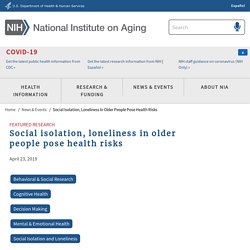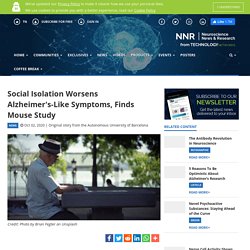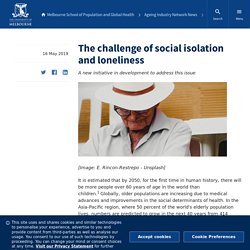

According to the socioemotional selectivity theory proposed by Laura Carstensen older adults value their remaining time to live and choose to spend it positively with people who support them emotionally. Though they have a small social network, it has a positive effect on their physical & mental well being and development. Social isolation can have detrimental effect on mental and physical health and is a serious public health problem. As care givers, it is important for us to know the effects of social isolation on the development of the elderly. This knowledge facilitates early detection of related health issues and timely intervention to sustain development in the elderly. Difference between social isolation and loneliness. Factors that lead to social isolation among the elderly. Factors that influence social isolation. Effects of social isolation on elderly development.
Dangers of social isolation. Social isolation, loneliness in older people pose health risks. Human beings are social creatures.

Our connection to others enables us to survive and thrive. Yet, as we age, many of us are alone more often than when we were younger, leaving us vulnerable to social isolation and loneliness—and related health problems such as cognitive decline, depression, and heart disease. Fortunately, there are ways to counteract these negative effects. NIA-supported researchers are studying the differences between social isolation and loneliness, their mechanisms and risk factors, and how to help people affected by these conditions.
“NIA is interested in exploring potential interventions to address social isolation and loneliness, which are both risk factors for poor aging outcomes,” said Lisbeth Nielsen, Ph.D., of NIA’s Division of Behavioral and Social Research. Social Isolation Worsens Alzheimer's-Like Symptoms, Finds Mouse Study. A study in mice conducted by the UAB shows that social isolation worsens the effects of Alzheimer's disease, with hyperactivity levels reaching up to twice as much as in the pathology itself.

The research also confirms an increase in the asymmetric atrophy of the hippocampus, a brain area central to memory The study was published in a special edition of Frontiers in Psychiatry entitled Death and Mourning Processes in the Times of the Coronavirus Pandemic (COVID-19), dedicated to assessing the effects of this pandemic Researchers at the Department of Psychiatry and Legal Medicine and at the Institut de Neurociències (INc) of the Universitat Autònoma de Barcelona (UAB) have conducted a study which allows estimating, from the viewpoint of translational neuroscience, the effects of isolation in the current pandemic scenarios in elderly patients with dementia.
The findings also may serve as a guide to the rethinking of vital conditions after the Covid-19 crisis. Role of care givers in elderly's development. The challenge of social isolation and loneliness. A new initiative in development to address this issue [Image: E.

Rincon-Restrepo - Unsplash] It is estimated that by 2050, for the first time in human history, there will be more people over 60 years of age in the world than children.1 Globally, older populations are increasing due to medical advances and improvements in the social determinants of health. In the Asia-Pacific region, where 50 percent of the world's elderly population lives, numbers are predicted to grow in the next 40 years from 414 million in 2010 to 1.25 billion.1,2 The current state: In Australia, the average life expectancy is now over 80 for both men and women and rising. Studies have found that older people who experience ‘extreme loneliness' are up to 26 percent more likely to die prematurely.4After the heat waves in Paris, Chicago, and the events in New York in 2001, reviews of elder deaths highlighted the importance of neighbourhood characteristics in preserving the lives of isolated older people.
References. Social isolation and the elderly poor in Singapore. SINGAPORE: Her one-room flat was a cluttered mess, and Madam Helen Fernandez herself never seemed to bathe, said her neighbours who always saw her in the same set of clothes. When case workers first visited the unkempt and confused elderly widow, they had to rush her to hospital for very high blood pressure – which resulted because she hadn’t been taking her medication and had been missing doctors’ appointments. Since her husband died 17 years ago, Mdm Fernandez had been living alone with no friends or family – and slowly falling prey to loneliness and dementia. There were times when she’d even call up the police just to talk. It was how her case got referred to the Social Service Office, and then to case worker Ahmala Rajoo in 2015. “She was receiving financial assistance, about S$500 a month,” said Ms Ahmala, a care executive with NTUC Health Cluster Support in Bukit Merah.
But the neatly-groomed Mdm Fernandez you meet today almost doesn’t seem the same person. “Her memory has worsened. Recommendations. Elderly Population in Singapore Understanding Social Physical a. Home alone older adults in singapore.